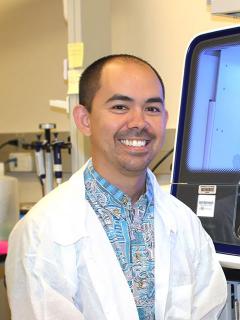Dr. Ndhlovu and Dr. Corley Publish Pivotal Finding in PLOS Pathogens
Dr. Lishomwa “Lish” Ndhlovu and Dr. Michael J. Corley, Division of Infectious Diseases, have published a breakthrough finding in PLOS Pathogens that shows abrupt and altered cell-type specific DNA methylation profiles in blood, seen during acute HIV infection, persist despite prompt initiation of antiretroviral therapy (ART).

Dr. Michael Corley

Dr. Lishomwa Ndhlovu
DNA methylation, an epigenetic marker, plays a key role in regulating the immune system during host-pathogen interactions, such as with HIV infection. This collaborative study, employed state-of-the-art strategies in the use of precision epigenetic data. The results, explains Dr. Ndhlovu, have been compelling in terms of generating new information on the earliest host pathogen interaction in key immune cell types during the earliest stage of acute HIV infection. The team identified specific epigenetic hotspots associated with acute HIV infection during the very early acute HIV period. “These hotspots,” explains Dr. Ndhlovu “warrant consideration as candidates for epigenome editing approaches in HIV prevention, treatment, and cure.”
Using cell-type specific DNA methylation profiling, the researchers explored whether epigenetic changes occurred soon after HIV infection and following early treatment (ART). Dr. Corley, lead author of the study noted that “we were struck that HIV rapidly embeds an epigenetic memory in immune cells that was not mitigated by anti-HIV drugs even when administered soon after diagnosis of HIV. These findings have implications for furthering discoveries that can lead to immune-epigenetic predictors of HIV pathogenesis and sequelae, and thus, have opened opportunities for novel therapeutic targets for disease prevention and amelioration.”
Dr. Lishomwa Ndhlovu, Professor of Immunology in Medicine, Division of Infectious Diseases, WDOM, and Professor of Immunology in Neuroscience in the Feil Family Brain & Mind Research Institute, has established the Laboratory of HIV Immunopathogenesis and emerging pathogens in the Belfer Research Building. Dr. Ndhlovu’s research is focused on HIV pathogenesis with an emphasis on the brain, and he has developed specific expertise and strategies to prevent, slow, or eliminate complications associated with HIV infection as well as discoveries for achieving a cure for HIV. He is a member of the International Neuro-HIV Cure Consortium, which provides cutting-edge neuro-HIV investigation and expertise globally, as well as co-Principal Investigator of the NIH funded HOPE HIV cure collaboratory.
Dr. Michael Corley, Assistant Professor of Immunology in Medicine, Division of Infectious Diseases, WDOM, is the recipient of a Core Facilities Seed Fund Grant from Cornell University, Cornell Center for Immunology. Dr. Corley obtained his Ph.D. and an M.A. from the University of Hawaii.

